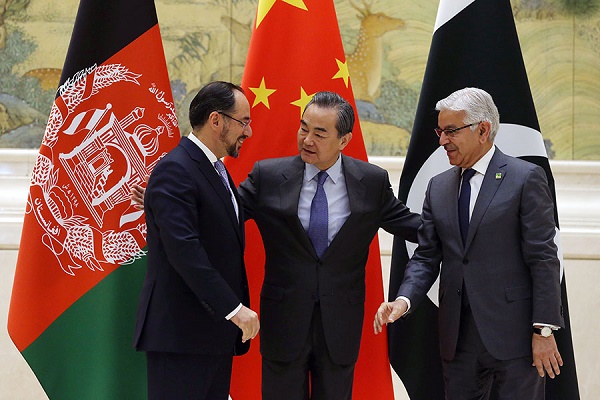Alwaght- While Afghanistan these days is undergoing developments related to the talks with the Taliban militant group, the country’s leaders are having busy days in the foreign policy.
In fact, the negotiations with the Taliban have given many countries opportunities to play a role in the Central Asian nation’s politics. In the meantime, the West, and mainly the US, is making huge efforts to monopolize the Afghan scene for US role play in the developments. Zalmay Khalilzad, the US special envoy to the Afghanistan peace, struggles to exclusively push the peace talks with the Taliban so that the US game principles in Afghanistan remain intact.
But it is not only the US that has been involved in dialogue with the militant group that has vast areas under its control in the war-hit nation. Iran, Russia, and Pakistan, and very recently China have taken steps to talk to the Taliban. The recent conference of the opposition groups with the Taliban delegation in the Russian capital Moscow is just one example of these ongoing efforts.
Meanwhile, China appears to have a different fashion to make its way in the Afghanistan developments. China’s Foreign Minister Wang Yi at a meeting on Saturday with his Kyrgyz counterpart Chingiz Aidarbekov proposed forming a contact group in the Shanghai Cooperation Organization (SCO) to work out a settlement for the decades-long Afghanistan war. The proposal is significant from a set of aspects.
Seeking Afghanistan peace using a regional organization
The formation of an Afghanistan contact group inside the SCO means that the member states will pursue a solution to the decades of violence in the county through the mechanisms governing a regional bloc which by the way has security and economic functions.
On the one hand, the nature of the organization, due to the existence of various political actors, increases the possibility of the success of the intra-Afghan talks. In this situation, of course, it is more likely and easier for the Afghan factions to strike a peace deal through SCO than go the long way of bilateral dialogue with the foreign players including the US that chase their own interests more than focus on the future of the Afghan people.
On the other hand, the SCO, because of its security function in Central Asia and presence of Afghanistan as an observer member beside other countries like Tajikistan and Iran with whom it shares cultural and lingual bonds, has a comparative advantage to push for peace in Afghanistan with a focus on the commonalities.
Furthermore, just unlike the pursuit of peace through talks with the US, pressing for peace through this regional bloc bears legitimacy for the central Afghan government. Kabul has been bemoaning the US-Taliban talks which it argues undermine the legitimacy of the government because so far no place is given to the administration of President Ashraf Ghani in the process. So, under the SCO initiative, Ghani administration has no concerns about being neglected in any future solution with the Taliban.
China’s own drives to propose the Contact group
China has its own objectives behind involving the SCO in the Afghan peace case.
It is quite natural that China, a key political and economic rival to the US, struggles not to fall behind in the Afghanistan developments scene. The heavy presence of the Chinese companies in the Afghan projects bears witness to this effort. And now while Washington claims to pursue peace, Beijing cannot sit on its hands and watch. In October 2018, Yao Jing, the Chinese ambassador to Pakistan, in a press conference told of Iran and Afghanistan participation in China-Pakistan Economic Corridor (CPEC). In March 2018, China’s FM had said that pursuit of win-win policy and common interests persuaded Beijing to expand the CPEC project to Afghanistan. Afghanistan is a gate to Central Asia, something taking attention of such powers as Chain and India to the peace process in the country, under the Western occupation for nearly two decades.
The SCO entry to the Afghan peace efforts will greatly challenge the US exclusive initiative there. Besides, playing this role will be uplifting to the SCO image and will promote this Eastern organization in the face of the Western counterparts.
China also has security worries about its Uyghur minority’s militants fighting the central government in Afghanistan beside the Taliban and other Salafi militias. The Xinjiang province of China is home to the Muslim-majority Uygurs who embrace Salafism and are viewed by Beijing presenting a potential threat to the national security as so far many of them joined the terrorist groups in Afghanistan, Syria, and Iraq. By joining the peace negotiations, China will ease part of its concerns once Afghanistan sees rise to power of the Taliban under a future peace deal.
All in all, in China’s eyes, the Afghanistan crisis has no military solution. Beijing has always been critical of the US and NATO military presence in the country and insisted that the settlement lies in peaceful processes and dialogue. The contact group initiative in SCO represents this Chinese mindset about Afghanistan developments.



























